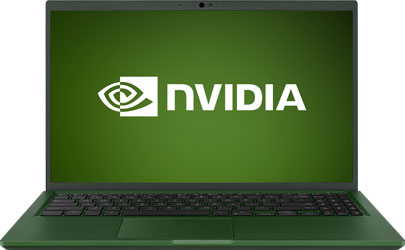Report an Error
NVIDIA GeForce GTX 1050 Ti Max-Q
- Graphics Processor
- GP107
- Cores
- 768
- TMUs
- 48
- ROPs
- 32
- Memory Size
- 4 GB
- Memory Type
- GDDR5
- Bus Width
- 128 bit
Recommended Gaming Resolutions:
- 1600x900
- 1920x1080
- 2560x1440
The GeForce GTX 1050 Ti Max-Q was a mobile graphics chip by NVIDIA, launched on January 3rd, 2018. Built on the 14 nm process, and based on the GP107 graphics processor, in its N17P-G1-A1 variant, the chip supports DirectX 12. This ensures that all modern games will run on GeForce GTX 1050 Ti Max-Q. The GP107 graphics processor is an average sized chip with a die area of 132 mm² and 3,300 million transistors. It features 768 shading units, 48 texture mapping units, and 32 ROPs. NVIDIA has paired 4 GB GDDR5 memory with the GeForce GTX 1050 Ti Max-Q, which are connected using a 128-bit memory interface. The GPU is operating at a frequency of 1152 MHz, which can be boosted up to 1291 MHz, memory is running at 1752 MHz (7 Gbps effective).
Its power draw is rated at 75 W maximum. This device has no display connectivity, as it is not designed to have monitors connected to it. Rather it is intended for use in laptop/notebooks and will use the output of the host mobile device. GeForce GTX 1050 Ti Max-Q is connected to the rest of the system using a PCI-Express 3.0 x16 interface.
Its power draw is rated at 75 W maximum. This device has no display connectivity, as it is not designed to have monitors connected to it. Rather it is intended for use in laptop/notebooks and will use the output of the host mobile device. GeForce GTX 1050 Ti Max-Q is connected to the rest of the system using a PCI-Express 3.0 x16 interface.
Graphics Processor
Mobile Graphics
- Release Date
- Jan 3rd, 2018
- Generation
- GeForce 10 Mobile
- Predecessor
- GeForce 900M
- Successor
- GeForce 20 Mobile
- Production
- End-of-life
- Bus Interface
- PCIe 3.0 x16
- Reviews
- 58 in our database
Relative Performance
Based on TPU review data: "Performance Summary" at 1920x1080, 4K for 2080 Ti and faster.
Performance estimated based on architecture, shader count and clocks.
Clock Speeds
- Base Clock
- 1152 MHz
- Boost Clock
- 1291 MHz
- Memory Clock
-
1752 MHz
7 Gbps effective
Memory
- Memory Size
- 4 GB
- Memory Type
- GDDR5
- Memory Bus
- 128 bit
- Bandwidth
- 112.1 GB/s
Render Config
- Shading Units
- 768
- TMUs
- 48
- ROPs
- 32
- SM Count
- 6
- L1 Cache
- 48 KB (per SM)
- L2 Cache
- 1024 KB
Theoretical Performance
- Pixel Rate
- 41.31 GPixel/s
- Texture Rate
- 61.97 GTexel/s
- FP16 (half)
- 30.98 GFLOPS (1:64)
- FP32 (float)
- 1.983 TFLOPS
- FP64 (double)
- 61.97 GFLOPS (1:32)
Board Design
- TDP
- 75 W
- Outputs
- Portable Device Dependent
- Power Connectors
- None
- Board Number
- E2904 SKU 1
Graphics Features
- DirectX
- 12 (12_1)
- OpenGL
- 4.6
- OpenCL
- 3.0
- Vulkan
- 1.3
- CUDA
- 6.1
- Shader Model
- 6.8
GP107 GPU Notes
| NVENC: 6th Gen NVDEC: 3rd Gen PureVideo HD: VP8 VDPAU: Feature Set H Latest Drivers: Windows 7 / 8 / 8.1 (x32 / x64): GeForce Release 391.35 / 474.89 Quadro Release R390 U9 (392.37) / R440 U4 (441.66) Data Center Release 427.11 Windows 10 / 11 (x32 / x64): GeForce Release 391.35 / Latest Quadro Release R390 U9 (392.37) / Latest Data Center Release: Latest |
Devices based on this design (1)
| Name | GPU Clock | Boost Clock | Memory Clock | Other Changes |
|---|---|---|---|---|
| 1291 MHz | 1417 MHz | 1752 MHz |
Nov 2nd, 2024 11:26 EDT
change timezone
Latest GPU Drivers
New Forum Posts
- AAF Optimus Modded Driver For Windows 10 & Windows 11 (106)
- E-cores still evolve. But is there a reason for it? (104)
- DDR5 Trident Z Royal (12)
- [Intel AX1xx/AX2xx/AX4xx/AX16xx/BE2xx/BE17xx] Intel Modded Wi-Fi Driver with Intel® Killer™ Features (141)
- Free Games Thread (4119)
- TPU's Nostalgic Hardware Club (19323)
- Switching to AMD after 15 years, need AM5 motherboard advice (74)
- Starfield discussion thread (1702)
- Do you use Linux? (485)
- Getting Cache hierarchy error (11)
Popular Reviews
- Call of Duty: Black Ops 6 Performance Benchmark Review - AMD FTW
- Intel Core Ultra 9 285K Review
- TOPPING D90 III Discrete DAC + A90 Discrete Amplifier Review
- HIFIMAN Mini Shangri-La Electrostatic Headphones + Amplifier Review
- G-Wolves Hati-R 8K Review
- TRYX ROTA Pro 120 mm Fan Review
- SilverStone ALTA D1 Review
- Enermax PlatiGemini 1200 W Review
- Intel Core Ultra 7 265K Review
- Glorious GMMK 3 Pro HE Wireless Keyboard Review
Controversial News Posts
- Quick Denuvo DRM Cracks Cost Game Publishers 20% in Revenue, According to Study (134)
- MSI OCLab Reveals Ryzen 9000X3D 11-13% Faster Than 7000X3D, AMD Set to Dominate "Arrow Lake" in Gaming (123)
- AMD Ryzen 7 9800X3D Comes with 120W TDP, 5.20 GHz Boost, All Specs Leaked (119)
- Single-Player Games Lose to PVP in Younger Audiences Despite Recent Hits (117)
- Intel's Core Ultra 9 285K Performance Claims Leaked, Doesn't Beat i9-14900K at Gaming (114)
- NVIDIA Tunes GeForce RTX 5080 GDDR7 Memory to 32 Gbps, RTX 5070 Launches at CES (112)
- AMD Ryzen 7 9800X3D Has the CCD on Top of the 3D V-cache Die, Not Under it (110)
- Afraid of Spiders? Call of Duty: Black Ops 6's Accessibility Features Have You Covered (103)

